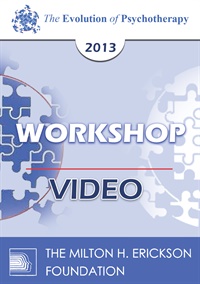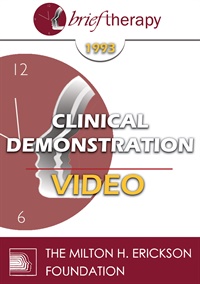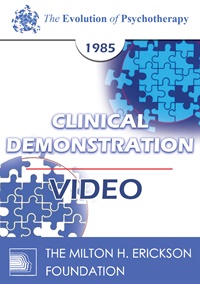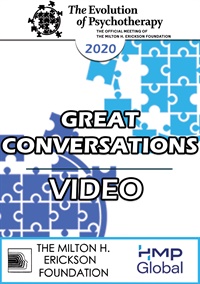
- Average Rating:
- Not yet rated
- Topic Areas:
- Depression | Great Conversations | Psychopharmacology | Psychotherapy
- Bundle(s):
- EP20 Highlights
- Categories:
- Evolution of Psychotherapy | Evolution of Psychotherapy 2020
- Faculty:
- Michael Yapko, PhD | Erving Polster, PhD
- Course Levels:
- Master Degree or Higher in Health-Related Field
- Duration:
- 1 hour
- Format:
- Audio and Video
- Original Program Date:
- Dec 11, 2020
- Short Description:
- In this thought-provoking dialogue, two master clinicians explore why antidepressants alone cannot solve depression and why human connection remains central to healing. Drawing from psychotherapy, hypnosis, and Gestalt traditions, they examine depression as a social—not biological—condition shaped by isolation, loss, and disconnection. The conversation highlights how curiosity, enchantment, and shared meaning within relationships and groups can restore vitality, resilience, and purpose in modern clinical practice.
- Price:
-
Sale is $29.00
price reduced from Base Price - $59.00
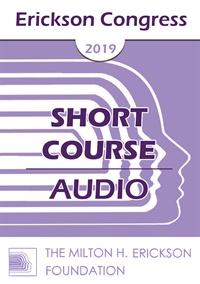
- Average Rating:
- Not yet rated
- Topic Areas:
- Short Courses | Ericksonian Hypnosis and Therapy Techniques | Group Therapy | Hypnosis | Dialectic Behavior Therapy (DBT) | Group Psychotherapy | Psychotherapy
- Categories:
- Erickson Congress | Erickson Congress 2019
- Faculty:
- Malvina Tsounaki, MS
- Duration:
- 1 Hour 14 Minutes
- Format:
- Audio Only
- Original Program Date:
- Dec 12, 2019
- Short Description:
- This short course will present the systemic, dialectic, multilevel, multifocal, model of group therapy utilized at the Institute of Anthropos in Athens, Greece. The approach is influenced by Ericksonian methods and additional techniques from other perspectives have been added.
- Price:
- $15.00 - Base Price

- Average Rating:
- Not yet rated
- Topic Areas:
- Workshops | Developmental Therapy Model | Couples Therapy | Leadership | Therapist Development
- Categories:
- Couples Conference | Couples Conference 2017 | Pioneers in Couples and Family Therapy
- Faculty:
- Ellyn Bader, PhD
- Duration:
- 53:04
- Format:
- Audio Only
- Original Program Date:
- Apr 01, 2017
- Short Description:
- Ellyn Bader's workshop illuminates strong leadership in couples therapy, demonstrating techniques to create impactful client experiences. Through a detailed case study, she introduces the developmental model, showcasing interventions like partner-described complaints and a revealing paper exercise. The session emphasizes differentiation, self-reflection, and building positive therapeutic environments, ultimately guiding therapists to enhance their personal effectiveness and client interactions.
- Price:
- $15.00 - Base Price
- Average Rating:
- Not yet rated
- Topic Areas:
- Workshops | Domestic Violence | Group Therapy | Psychotherapy | Gottman Method | LGBTQ
- Categories:
- Evolution of Psychotherapy 2013 | Evolution of Psychotherapy
- Faculty:
- John Gottman, PhD | Julie Gottman, PhD
- Course Levels:
- Master Degree or Higher in Health-Related Field
- Duration:
- 1:38:39
- Format:
- Audio and Video
- Original Program Date:
- Dec 15, 2013
- Short Description:
- Current meta-analysis by Julia Babcock shows that same-sex group treatment for domestic violence is ineffective. Couples treatment is illegal in many states. We will present the results (and methods) for treating only situational (not characterological) domestic violence that shows high effectiveness with lasting effects after 18 months. Treatment utilizes Gottman-method curriculum with 21 sessions of couples group work.
- Price:
-
Sale is $29.00
price reduced from Base Price - $59.00
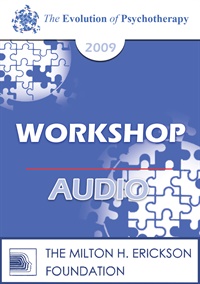
- Average Rating:
- Not yet rated
- Topic Areas:
- Couples Therapy | Workshops | Domestic Violence | Group Therapy | Psychotherapy
- Categories:
- Evolution of Psychotherapy | Evolution of Psychotherapy 2009
- Faculty:
- John Gottman, PhD | Julie Gottman, PhD
- Duration:
- 1 Hour 56 Minutes
- Format:
- Audio Only
- Original Program Date:
- Dec 10, 2009
- Short Description:
- This workshop describes a 22-session couples’ group intervention and curriculum for lower and middle-class couples. Each session begins with a talk-show video showing discussions with couples in poverty on curriculum topics, e.g.’ healing from infidelity, avoiding and healing from domestic violence, etc. The video is followed by group discussion, a brief teaching,and an exercise that focuses on learning new skills. Throughout most of the curriculum,, physiological soothing is taught through biofeedback. Details of the curriculum and video samples will be shown.
- Price:
- $15.00 - Base Price
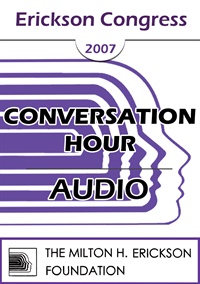
- Average Rating:
- Not yet rated
- Topic Areas:
- Conversation Hours | Ericksonian Hypnosis and Therapy Techniques | Cross-Cultural Therapy | Meditation, Spirituality and Yoga
- Categories:
- Erickson Congress | Erickson Congress 2007
- Faculty:
- Jorge Abia, MD | Sofia Bauer | Teresa Robles, MA, PhD
- Duration:
- 51:22
- Format:
- Audio Only
- Original Program Date:
- Dec 08, 2007
- Short Description:
- This conversation hour offers an inside look at how Ericksonian hypnosis is practiced, adapted and expanded across Latin America. Clinicians from Mexico and Brazil discuss cultural influences on trance, the role of traditional medicine, and the balance between scientific rigor, intuition and spirituality. Participants hear how Ericksonian ideas take shape in diverse communities and why flexibility, cultural sensitivity and creative use of hypnotic language are essential in these settings.
- Price:
- $15.00 - Base Price
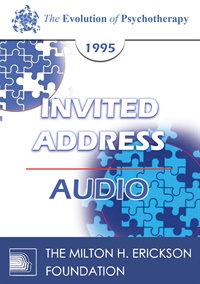
- Average Rating:
- Not yet rated
- Topic Areas:
- Invited Addresses | Gestalt | Group Therapy | Psychotherapy | Group Psychotherapy
- Categories:
- Evolution of Psychotherapy | Evolution of Psychotherapy 1995
- Faculty:
- Miriam Polster | Alexander Lowen, MD
- Duration:
- 1 Hour 22 Minutes
- Format:
- Audio Only
- Original Program Date:
- Dec 17, 1995
- Short Description:
- The proliferation of therapeutic groups, either self-help or professionally staffed, has dramatically expanded the applicability of psychotherapy. This development reflects society's increased willingness to deal communally with personal problems that were previously restricted to private psychotherapeutic sessions. Gestalt group therapy, with its original emphasis on the freshness and pungency of individual experience has also extended its perspective to group work. Dr. Miriam Polster describes how the gestalt approach enlivens group focus and interaction through its principles of awareness and experiment-and especially through its attention to the quality of the contact between group members.
- Price:
- $15.00 - Base Price
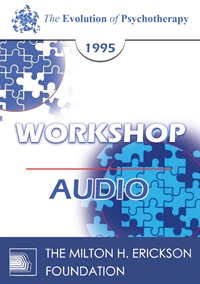
- Average Rating:
- Not yet rated
- Topic Areas:
- Workshops | Group Therapy | Psychotherapy | Group Psychotherapy
- Categories:
- Evolution of Psychotherapy | Evolution of Psychotherapy 1995
- Faculty:
- Irvin Yalom, PhD
- Duration:
- 49 Minutes
- Format:
- Audio Only
- Original Program Date:
- Dec 14, 1995
- Short Description:
- Fundamentals of Group Therapy: Selection of patients, preparation, group development, tasks and techniques of the therapist. Use of video vignettes will illustrate fundamentals.
- Price:
- $15.00 - Base Price
- Average Rating:
- Not yet rated
- Topic Areas:
- Clinical Demonstrations | Group Therapy | Single-Session | Brief Therapy
- Categories:
- Brief Therapy Conference | Brief Therapy Conference 1993
- Faculty:
- Mary Goulding, MSW
- Course Levels:
- Master Degree or Higher in Health-Related Field
- Duration:
- 57:06
- Format:
- Audio and Video
- Original Program Date:
- Dec 11, 1993
- Short Description:
- BT93 Clinical Demonstration 16 - One-Session Group Therapy with Six Clients (Real) From the Audience - Mary Goulding, MSW
- Price:
-
Sale is $29.00
price reduced from Base Price - $59.00
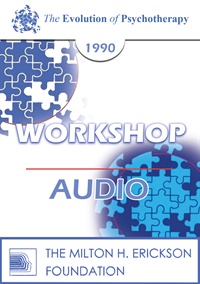
- Average Rating:
- Not yet rated
- Topic Areas:
- Workshops | Group Therapy | Psychotherapy | Redecision Therapy
- Categories:
- Evolution of Psychotherapy | Evolution of Psychotherapy 1990
- Faculty:
- Mary Goulding, MSW
- Duration:
- 2 Hours 32 Minutes
- Format:
- Audio Only
- Original Program Date:
- Dec 16, 1990
- Short Description:
- A therapy group will be formed from Conference participants, in order to demonstrate what can be accomplished in a single group session. Emphasis will be on establishing therapeutic contracts for change and using the past to effect this change. Discussion and whole-group experiences will follow the therapy demonstration.
- Price:
- $15.00 - Base Price
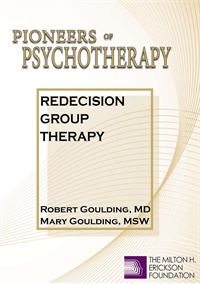
- Average Rating:
- Not yet rated
- Topic Areas:
- Clinical Demonstrations | Group Therapy | Redecision Therapy | Psychotherapy | Confrontation | Humor
- Bundle(s):
- Pioneers of Psychotherapy Bundle
- Categories:
- Pioneers of Psychotherapy | Evolution of Psychotherapy | Evolution of Psychotherapy 1985
- Faculty:
- Mary Goulding, MSW | Robert L. Goulding, MD
- Course Levels:
- Master Degree or Higher in Health-Related Field
- Duration:
- 00:58:00
- Format:
- Audio and Video
- Original Program Date:
- Dec 13, 1985
- Short Description:
- Robert and Mary Goulding (1985), working as cotherapists, demonstrate using five volunteer clients. The concerns of each individual are addressed during the therapy session. The Gouldings help define each person’s goals and establish a contract for change. The session includes role-play, fantasy, confrontation and the use of humor.
- Price:
- $59.00 - Base Price
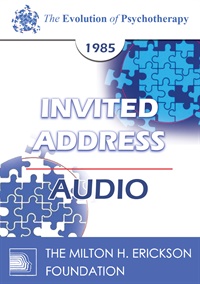
- Average Rating:
- Not yet rated
- Topic Areas:
- Invited Addresses | Virginia Satir | Group Therapy | Psychotherapy
- Categories:
- Evolution of Psychotherapy | Evolution of Psychotherapy 1985
- Faculty:
- Robert L. Goulding, MD | Virginia Satir, MA, ACSW
- Duration:
- 1 Hour 15 Minutes
- Format:
- Audio Only
- Original Program Date:
- Dec 12, 1985
- Short Description:
- Invited Address Session 5 - Part 2 - Group Therapy: Mainline or Sideline? featuring Robert L. Goulding, MD. With discussant Virginia M Satir, ACSW. Moderated by F. Theodore Reid, Jr, MD.
- Price:
- $15.00 - Base Price
- Average Rating:
- Not yet rated
- Topic Areas:
- Clinical Presentations | Group Therapy | Redecision Therapy | Psychotherapy
- Categories:
- Evolution of Psychotherapy | Evolution of Psychotherapy 1985
- Faculty:
- Mary Goulding, MSW | Robert L. Goulding, MD
- Course Levels:
- Master Degree or Higher in Health-Related Field
- Duration:
- 54:15
- Format:
- Audio and Video
- Original Program Date:
- Dec 11, 1985
- Short Description:
- Clinical Presentation 04 - Redecision Group Therapy featuring Robert L Goulding, MD, and Mary M Goulding, MSW.
- Price:
- $59.00 - Base Price
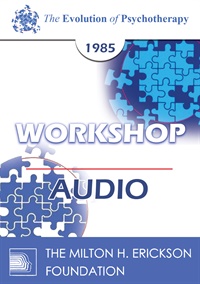
- Average Rating:
- Not yet rated
- Topic Areas:
- Workshops | Psychotherapy | Group Psychotherapy | Group Therapy | Supervision | Redecision Therapy
- Categories:
- Evolution of Psychotherapy | Evolution of Psychotherapy 1985
- Faculty:
- Robert L. Goulding, MD
- Duration:
- 2 Hours 42 Minutes
- Format:
- Audio Only
- Original Program Date:
- Dec 11, 1985
- Short Description:
- Using video recording and play back, I will supervise attendees doing psychotherapy with peers in a group setting.
- Price:
- $15.00 - Base Price


